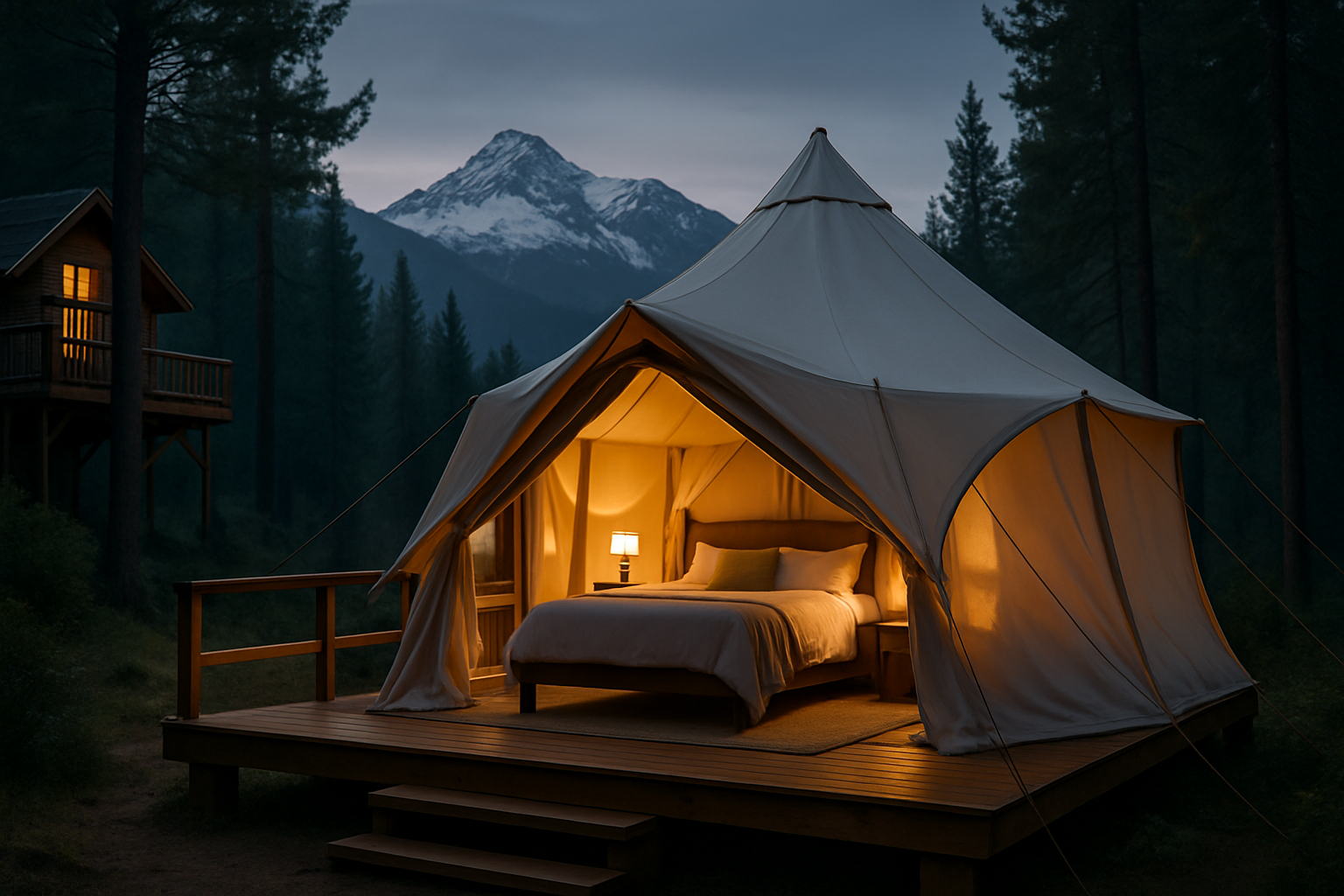Glamping in Unconventional Locales: Redefining Luxury in the Great Outdoors
The allure of nature combined with the comfort of high-end amenities has given rise to a unique travel trend: glamping in unconventional locales. This fusion of glamour and camping is no longer confined to traditional wilderness settings. Adventurers are now seeking out extraordinary experiences in unexpected places, from urban rooftops to remote islands, redefining what it means to commune with nature without sacrificing luxury.

The rise of glamping in unconventional locales can be attributed to several factors. Travelers are increasingly seeking unique experiences that offer both comfort and adventure. Additionally, the desire to connect with nature without sacrificing modern amenities has driven innovation in the hospitality industry. This has led to the creation of glamping sites in places one might never expect to find them.
Urban Glamping: Nature in the Heart of the City
One of the most intriguing developments in the glamping world is the emergence of urban glamping experiences. These offer a unique blend of city life and nature retreat, allowing travelers to escape the hustle and bustle without leaving the metropolis.
Rooftop glamping has gained popularity in cities like New York and London. Imagine spending the night in a luxury tent atop a skyscraper, with panoramic views of the cityscape. These urban oases often feature amenities like private bathrooms, gourmet dining options, and even stargazing experiences, all while being just steps away from the city’s attractions.
Another urban glamping trend is the transformation of city parks into temporary glamping grounds. Cities like Paris and Tokyo have experimented with pop-up glamping events, allowing residents and tourists to experience nature within the urban environment. These initiatives not only provide a unique travel experience but also promote the use and appreciation of urban green spaces.
Extreme Environment Glamping
For those seeking more adventurous experiences, glamping in extreme environments offers an unparalleled opportunity to explore some of the world’s most challenging landscapes in comfort.
Arctic glamping has gained traction among luxury travelers. In places like Finland and Iceland, travelers can stay in heated glass igloos or specially designed pods that offer protection from the harsh elements while providing stunning views of the Northern Lights. These accommodations often come equipped with thermal gear, gourmet dining experiences, and guided excursions on glaciers or dog sledding adventures.
On the opposite end of the spectrum, desert glamping has become increasingly popular. In locations like the Sahara or the Arabian Desert, luxury camps offer air-conditioned tents, private pools, and even spa services. Guests can enjoy camel rides, sandboarding, and stargazing in some of the world’s most pristine dark sky reserves, all while retreating to the comfort of their opulent desert oasis.
Underwater and Floating Glamping
Perhaps the most unconventional of all glamping experiences are those that take place on or under the water. These unique accommodations push the boundaries of traditional camping and offer truly immersive nature experiences.
Underwater glamping pods have emerged as a luxury option in tropical destinations. In the Maldives and Fiji, travelers can sleep in transparent underwater rooms, surrounded by vibrant marine life. These pods often feature 360-degree views of the underwater world, allowing guests to observe sea creatures from the comfort of their bed.
Floating glamping sites have also gained popularity on lakes and rivers around the world. From floating cabins in Sweden to luxury houseboats in Kerala, India, these accommodations offer a unique perspective on aquatic environments. Many of these floating retreats are eco-friendly, using solar power and sustainable materials to minimize their environmental impact.
The Impact on Local Communities and Environments
While glamping in unconventional locales offers exciting opportunities for travelers, it also raises important considerations about sustainability and impact on local communities. Many glamping operators are taking steps to ensure their accommodations have a positive impact on the surrounding area.
In some cases, glamping sites serve as a form of eco-tourism, providing economic opportunities for local communities while promoting conservation efforts. For example, luxury tented camps in African national parks often employ local staff and contribute to wildlife preservation initiatives.
However, the development of glamping sites in sensitive environments also poses challenges. It’s crucial for operators to implement sustainable practices, such as using renewable energy sources, minimizing waste, and respecting local ecosystems. Many successful glamping sites have found ways to integrate seamlessly with their surroundings, offering educational experiences that foster a deeper appreciation for nature and local cultures.
Glamping Etiquette and Preparation Tips
-
Research the specific amenities provided at your glamping site to pack appropriately
-
Respect quiet hours and fellow glampers’ privacy, especially in shared spaces
-
Familiarize yourself with the local environment and any potential wildlife encounters
-
Participate in eco-friendly practices promoted by the glamping site
-
Consider booking during shoulder seasons for a more intimate experience and potentially lower rates
-
Embrace the unique aspects of your unconventional locale, such as stargazing or local cultural experiences
As the travel industry continues to evolve, glamping in unconventional locales stands out as a trend that combines luxury, adventure, and environmental consciousness. This innovative approach to outdoor accommodation allows travelers to experience nature in new and exciting ways, pushing the boundaries of traditional camping. Whether it’s sleeping under the stars in an urban jungle or waking up to underwater vistas, these unique glamping experiences offer a fresh perspective on the world around us, inviting us to reimagine our relationship with nature and travel.






